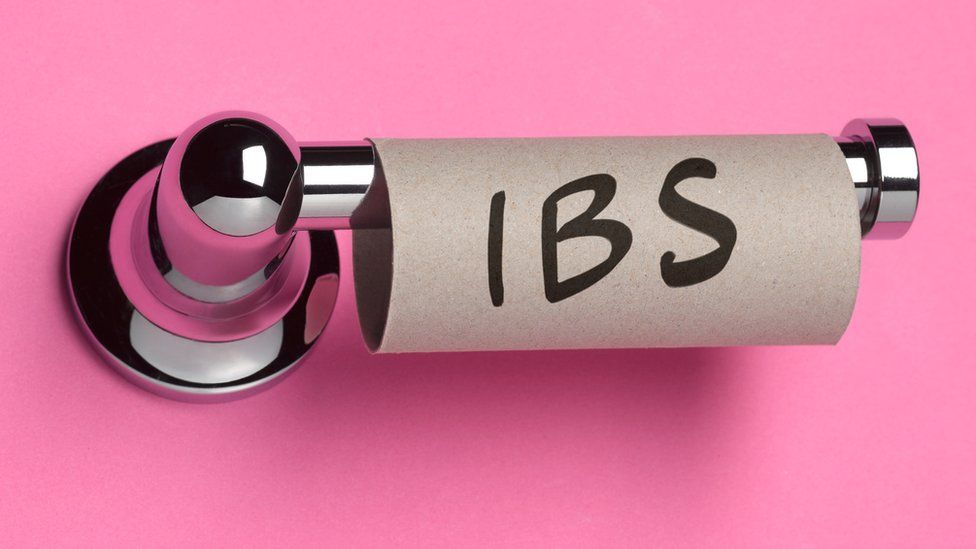Genes may go some way towards explaining why a common but poorly understood gut disorder - irritable bowel syndrome (IBS) - is often linked to anxiety, say researchers.
They hope their discovery will stop IBS being wrongly labelled as an emotional state or "all in the mind".
The team studied more than 50,000 individuals with IBS, comparing their DNA with that of healthy people.
The results are published in the journal Nature Genetics.
IBS is thought to affect about one in 10 people and can cause distressing abdominal pain, bloating and bouts of constipation, diarrhoea or both.
With no defining test, diagnosis comes after ruling out other causes.
Women are slightly more affected than men, and the usual age for patients to seek advice is between 20 and 40.
Prof Miles Parkes, a consultant gastroenterologist at Cambridge's Addenbrookes Hospital who led the gene research, says IBS is still poorly understood, even by some doctors, and may be incorrectly categorised as psychosomatic because of the overlap with anxiety and stress.
He and his team say they have identified at least six distinct genetic differences that might, at least partly, explain this link between the gut and the mind.
The results showed:
- Overall, heritability of IBS (how much your genes influence the likelihood of developing a particular condition) is quite low
- Six genetic differences were more common in people with IBS than in controls
- Most of these have roles in the brain, and possibly the nerves which supply the gut, rather than the gut itself
- The same genetic make-up that puts people at increased risk of IBS also increases the risk for common mood and anxiety disorders such as anxiety, depression, and neuroticism, as well as insomnia
That doesn't mean anxiety causes IBS symptoms or vice versa, says Prof Parkes.
"Our study shows these conditions have shared genetic origins, with the affected genes possibly leading to physical changes in brain or nerve cells that in turn cause symptoms in the brain and symptoms in the gut."
The discovery might ultimately help with developing better tests and treatments for IBS.
< Watch the video at the source page. >
Laura Tebbs, who is 34 and from Cambridge, has experience living with IBS symptoms and anxiety and depression.
"I've had bouts of depression and anxiety for a decade so I know what it is like to live with that, but my IBS began after I caught Covid this January.
"It's hard for some people to understand, but IBS really is quite a challenging thing to live with.
"I was in constant pain every time I ate. And I'd get really bloated. It was so bad that I couldn't wear any of my normal trousers or jeans. I just lived in leggings instead.
"I was tired and moody and couldn't do things that I would normally enjoy, like going out for a meal with mates."
Laura says she was "fobbed off" by some healthcare professionals who, she says, dismissed her condition and recommended laxatives for one of her symptoms - constipation.
She is now under Prof Parkes's care and has found ways to better manage her condition.
"It's much better now, and if I do have a flare-up there I things I can do to change it."
IBS tips
Medication may be needed, but there are some other things that can help too.
To ease bloating, cramps and wind, consider:
- Eat oats, such as porridge
- Fresh ingredients, rather than lots of processed, fatty or spicy foods, is good but don't overdo it with the fruit and beans because they can cause diarrhoea and bloating
- Cauliflower, cabbage, sprouts and onions can be tricky for some people to digest too
- You could try probiotics or low lactose or lactose-free dairy products for a month and see if they help
- Don't delay or skip meals
- Avoid lots of alcohol, caffeine or fizzy drinks, but do drink plenty of water to keep your poo nicely soft (rather than too runny or hard)
- Take time over meals - don't eat too quickly
For constipation:
- Drink plenty of water to make poo softer
- Eat fibre - linseeds, for example, helped Laura
For diarrhoea:
- Consider cutting back a bit on fibre if you are eating lots of it
- Chewing lots of sugar-free gum containing sorbitol is another "no-no" - it can have a laxative effect
- Make sure you are drinking enough fluid to replace what you are losing and avoid dehydration
Source: NHS
- Karlston
-

 1
1



Recommended Comments
There are no comments to display.
Join the conversation
You can post now and register later. If you have an account, sign in now to post with your account.
Note: Your post will require moderator approval before it will be visible.